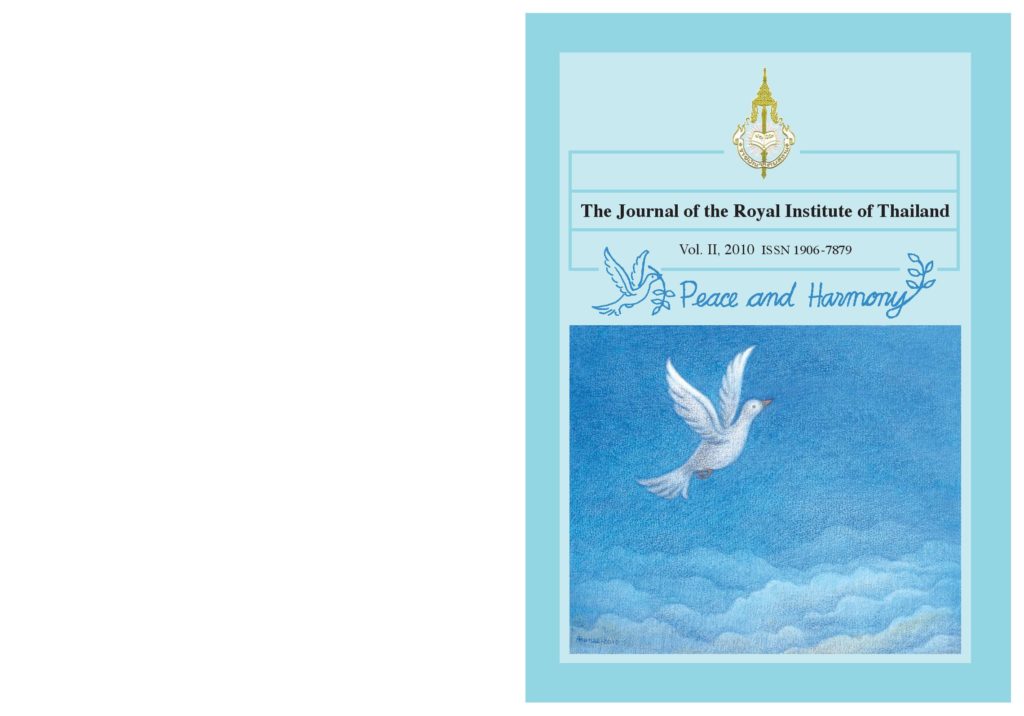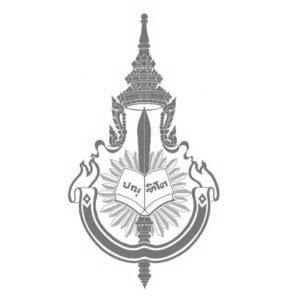
Foreword from the President
of the Royal Institute of Thailand
In this second English issue of the Journal of the Royal Institute, I am particularly pleased that there are several papers promoting peace and harmony, of which our country now has great need, in order to ensure its continued survival and progress. Conflicts within the country and with our neighbour have been threatening peace and unity for some time, and if these conflicts cannot be amicably resolved, our country will be weakened. By uniting in our efforts to solve the serious political and economic problems facing the country and the whole world, we may succeed in bringing benefit to all. Practical strategies: academic, social, ethical and spiritual should be mapped out as a guideline. We need progress in every field of knowledge in order to contribute to the welfare of the people all over the world. The Journal of the Royal Institute aims to contribute towards this objective as much as possible.
(Professor Dr. Panya Borisutdhi)
President of the Royal Institute
Editor’s Note
Peace and Harmony is the theme of the Journal of the Royal Institute of Thailand Volume II, 2010. As the present world is facing many conflicts and terrorist activities, we are looking for ways to attain peace and harmony. We cannot leave it to peace activists alone to find the solutions leading to peace and harmony.
All of us must join forces to make the world a better place in which to live. The Journal Volume II is the forum.
All religions stress the importance of peace and harmony, yet religions themselves are often the cause of conflict and violence. However, to turn our back on religion is a worse course of action. To see or hear both sides of the story, to reason, to forgive and to seek the middle path or moderation are recommended for all. If we can get to the root of the conflict which may be racial, political, religious, economic, psychological or moral, we can find the right solution to end the conflict peacefully and avoid violence in any form. Speaking of peace and non-violence, Mahatma Gandhi’s words and deeds come to our mind. Many people have heeded his words and adopted his method of non-violence or Ahimsa very successfully. Nelson Mandela in South Africa, Martin Luther King Jr. in the United States of America, Vaclav Havel in Czechoslovakia (now Czech and Slovakia) can be cited as examples. Yet we must take note that to attain peace, truth and non-violence must join forces. Without truth, that is, if the cause is erroneous, non-violence will be an empty word that will not be achieved, and peace will not be possible. That is why Gandhi calls his method Satyagraha which in Sanskrit means “holding fast to truth” Non-violence or Ahimsa for Gandhi does not simply mean “not using the violent means.” Non-violence, according to Gandhi, also means love, compassion and tolerance. Not using weapons may be easy, but it is very difficult to achieve true non-violence. Gandhi says, “We may never be strong enough to be entirely non-violent,
in thought, word and deed. But we must keep non-violence as our goal and make steady progress towards it … The truth of a few will count. The untruth of millions will vanish even like chaff before a whiff of wind.”
This volume offers readers various views concerning peace and harmony. While Mahatma Gandhi offers the use of Satyagraha, this forum is open wide for all ideas and contributions within and outside the theme.
Professor Emeritus Srisurang Poolthupya
Editor, Fellow of the Royal Institute
Editor
Professor Emeritus Srisurang Poolthupya, FRI.
Deputy Editor
Professor Dr. Somboon Suksamran, FRI.
Language Editors
Khunying Finola Chatamra
Dr. Gordon Hamilton
Editorial Board
Professor Dr. Likhit Dhiravegin, FRI.
Associate Professor Dr. Kris Chatamra, FRI.
Dr. Sobha Chupikulchai Spielmann, FRI.
Professor Dr. Pornsan Watanangura, AFRI.
Professor Dr. Prakong Nimmanahaeminda, AFRI.
Professor Dr. Sasithon Pukrittayakamee, AFRI.
Professor Dr. Sawasd Tantaratana, AFRI.
Professor Dr. Suthat Yoksan, AFRI.
Associate Professor Malithat Promathatavedi, AFRI.
Ms. Saengchant Sansupa, Director of Moral and Political Sciences Division.
Dr. Cholthicha Sudmuk, Literary Arts Officer.
Miss Rattikal Sriamphai, Literary Arts Officer.
Miss Itsariya Lauhatiranonda, Literary Arts Officer.
Cover Design
Associate Professor Asanee Chooarun, FRI.
